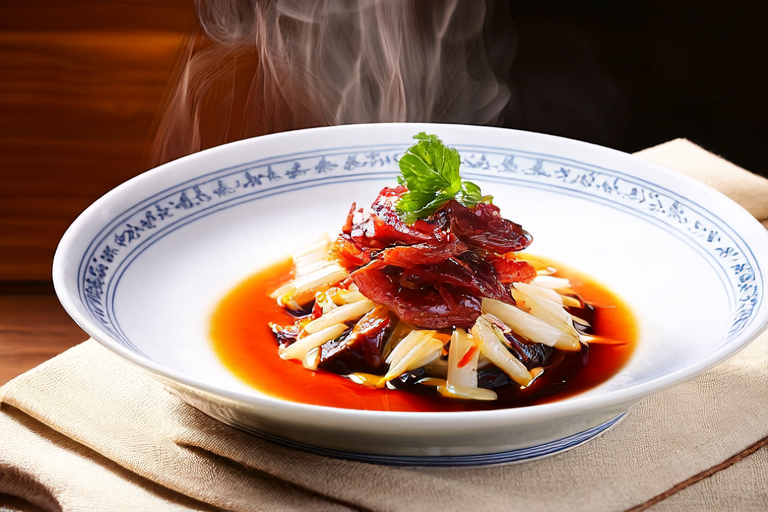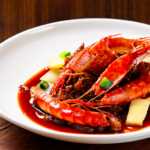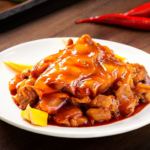Savoring the Essence: A Delicate Dish of Zhejiang Cuisine
Introduction to Zhejiang Cuisine
Zhejiang cuisine, one of the eight major cuisines in China, is renowned for its delicate flavors and refined techniques. It is characterized by its lightness, freshness, and the use of high-quality ingredients. The cuisine emphasizes the balance between sweet, salty, sour, and bitter tastes, creating dishes that are both elegant and comforting. In this article, we will explore a traditional dish from Zhejiang cuisine and delve into the preparation process, highlighting the nuances that make it a true masterpiece.
The Dish: Dongpo Pork (东坡肉)
Dongpo Pork, named after the famous Song Dynasty poet Su Dongpo, is a quintessential example of Zhejiang cuisine. This dish is known for its rich, savory flavor and tender texture. The pork belly is slow-cooked in a soy sauce-based broth until it becomes incredibly soft and flavorful. The dish is often served with rice or steamed vegetables, making it a perfect choice for a hearty meal.
Ingredients
- 500g pork belly, skin on
- 3 tablespoons soy sauce
- 2 tablespoons Shaoxing rice wine
- 1 tablespoon sugar
- 2 star anise
- 1 cinnamon stick
- 2 cloves
- 1 teaspoon salt
- 2 cups water
- Garnish: green onions, sesame oil
Preparation
- Cutting the Pork Belly: Start by cutting the pork belly into equal-sized pieces. Ensure that each piece has some skin attached for maximum flavor. Place the pieces in a pot and cover them with cold water. Bring the water to a boil over medium-high heat. Once boiling, drain the water and rinse the pork under cold running water. This step helps remove any impurities and excess fat.
- Marinating: In a bowl, mix together soy sauce, Shaoxing rice wine, sugar, star anise, cinnamon stick, cloves, and salt. Add the pork belly pieces to the marinade and let them sit for at least 30 minutes. This allows the flavors to penetrate the meat thoroughly.
- Cooking: Transfer the marinated pork belly along with the marinade to a large pot. Pour in enough water to cover the pork pieces. Bring the mixture to a boil over high heat, then reduce the heat to low. Cover the pot and simmer for about 2 hours, or until the pork is tender and easily falls apart when prodded with a fork.
- Braising: After the initial cooking, carefully transfer the pork pieces to a deep baking dish. Strain the cooking liquid, discarding the spices, and pour the strained liquid back over the pork. Return the dish to the oven and continue to braise for another 30 minutes. This step ensures that the pork absorbs all the flavors from the broth.
- Garnishing: Once the pork is fully cooked and tender, remove it from the oven. Garnish with sliced green onions and a drizzle of sesame oil. Serve hot with steamed rice or vegetables.
Tips for Success
- Ensure that the pork belly is fresh and of good quality. This will greatly enhance the final taste of the dish.
- When simmering the pork, avoid stirring too frequently as this can cause the meat to break apart prematurely.
- To achieve the best results, use a heavy-bottomed pot to prevent scorching and ensure even cooking.
- The cooking time may vary depending on the size of the pork pieces. Always check for tenderness before removing the dish from the oven.
Pairing Suggestions
Dongpo Pork pairs wonderfully with a variety of side dishes. It goes particularly well with steamed rice, which helps balance the richness of the pork. Additionally, you can serve it with lightly stir-fried vegetables like bok choy or Chinese broccoli to add some color and freshness to the plate. For a more indulgent experience, consider serving it with a side of pickled vegetables or a cucumber salad.
Conclusion
Dongpo Pork is not just a dish; it is a culinary journey through the rich history and culture of Zhejiang cuisine. By following the steps outlined above, you can recreate this classic dish in your own kitchen and savor its delicate essence. Whether you’re a seasoned chef or a novice cook, this recipe offers a rewarding experience that will leave you and your guests impressed. Enjoy the process of preparing this dish, and don’t forget to appreciate the subtle flavors that make it truly special.


